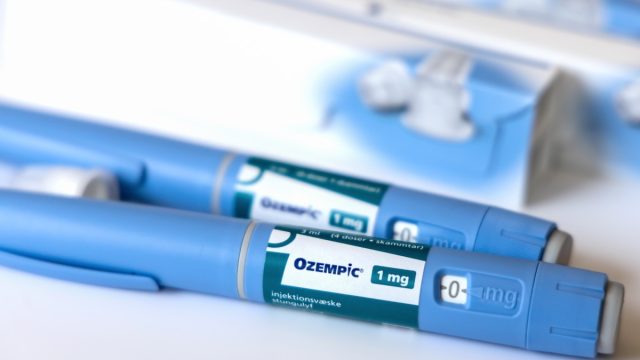Ozempic May Cause Dangerous Muscle Loss, Doctors Warn—Here’s How to Prevent That

Semaglutide, the active ingredient in Ozempic and its sister drug, Wegovy, can produce dramatic results for those who have struggled with stubborn pounds. But as with many things in life, it’s not exactly a perfect solution. Many users have reported serious side effects, which have caused them to discontinue use or, in extreme cases, landed them in the hospital. Now, doctors are addressing one of the more dangerous complications of weight-loss drugs: muscle loss.
RELATED: Ozempic Patients Say It “Stops Working” for Weight Loss—How to Prevent That.
When people drop big amounts of weight, they also lose lean body mass, which is often from muscle, doctors say.
“When we look at weight reduction from any intervention, about one-third of the weight we lose tends to be lean mass, and that can be problematic,” Jaime Almandoz, MD, an associate professor of internal medicine in the Division of Endocrinology at UT Southwestern Medical Center in Dallas, told NBC News last year. “Lean mass is healthier and associated with better metabolism, so when we lose lean mass, we may lose some of that function.”
The gradual loss of muscle mass, strength, and function is known in the medical world as sarcopenia, which typically affects the elderly population, according to Healthline. However, those taking semaglutide or tirzepatide—known by Eli Lilly’s brand names Mounjaro and Zepbound—can experience sarcopenia at any age.
Sometimes called “skinny fat,” sarcopenia can decrease quality of life and leave patients unable to perform daily tasks, Rekha Kumar, MD, an endocrinologist in New York City and chief medical officer of weight care platform Found, told the outlet.
Loss of muscle mass also increases the risk for lower bone density and injuries, according to Medscape. And while sarcopenia can affect anyone on these drugs, older adults need to be particularly mindful of preserving their lean muscle mass.
“These weight loss drugs, they basically cause the development of frailty in older patients in months instead of years,” Mitchell Steiner, MD, CEO of Veru, told The New York Times. (Veru is conducting a study to see if a compound could help preserve muscle and eliminate more fat in patients over 60 on weight-loss drugs.)
RELATED: What Really Happens If You Stop Taking Ozempic, Doctors Say.
So, while the number on the scale may go down dramatically thanks to Ozempic or Mounjaro, that doesn’t mean you’re automatically getting healthier, Michelle Hauser, MD, obesity medicine director of the Stanford Lifestyle and Weight Management Center, told the NYT.
Any level of weight loss with these drugs is likely to affect muscle mass, but doctors say there are ways to minimize the loss.
Medscape notes that both aerobic exercise and resistance training should be part of the treatment plan for patients on these medications. Resistance training is typically preferred over aerobic for preserving muscle mass and building strength, but aerobic exercise also has its benefits. However, while staying active is key, you don’t need to go crazy with your workout schedule.
“What I try to emphasize is we’re not trying to make you into a bodybuilder or something,” Scott Hagan, MD, an assistant professor of medicine at the University of Washington, told the NYT. “Two sessions a week of light weights could be very effective.”
Kumar also recommends two to three workouts a week, specifically resistance training.
“Fit it in when you can. Keep dumbbells at your desk at work to get a few reps in during a break, do a quick set of lunges down the hallway, or challenge yourself to hold a plank during the commercial break of your favorite TV show,” Kumar told Healthline.
RELATED: 7 Health Benefits of Ozempic That Aren’t About Weight Loss, According to Science.
What you eat on these medications is also important. Experts recommend a high-protein diet. According to Kumar, during active weight loss, you should eat between 25 to 30 grams of protein with each meal.
Not sure where the best sources of protein? She suggests low or nonfat Greek yogurt or cottage cheese instead of sour cream, and preparing lean proteins (like chicken) ahead of time. Beans are a great addition to a salad, she says, and it’s wise to go for quinoa over rice or pasta.
While you can mitigate muscle loss with your own, companies are also developing diet and exercise plans specifically for people on weight-loss drugs, the NYT reported.
Drugmakers, too, are addressing concerns about muscle loss. Eli Lilly partnered with BioAge Labs to test a compound (azelaprag) that would help improve muscle metabolism and function—and there’s an ongoing trial of a new drug, bimagrumab, which could help muscles get bigger by blocking receptors that oversee skeletal muscle and fat mass.
Best Life offers the most up-to-date information from top experts, new research, and health agencies, but our content is not meant to be a substitute for professional guidance. When it comes to the medication you’re taking or any other health questions you have, always consult your healthcare provider directly.